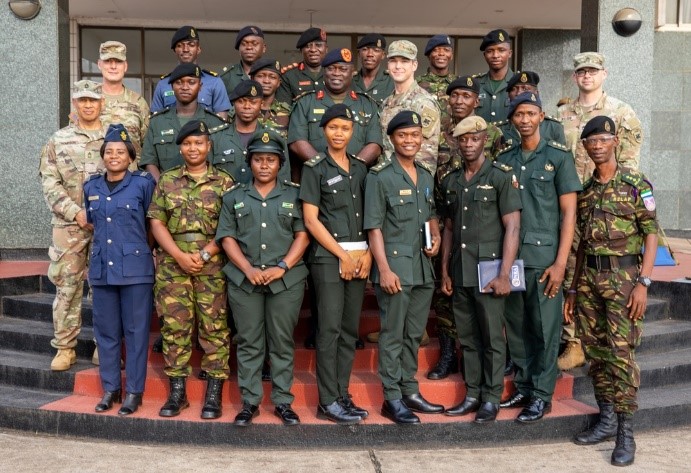AYV News, August 30, 2024
The Human Rights Commission of Sierra Leone (HRC-SL) has commended the Republic of Sierra Leone Armed Forces (RSLAF) for being a model of human rights compliance.
Vice Chairperson of HRCSL, Victor I. Lansana said: “The RSLAF has demonstrated moral courage by investigating its own members, as evidenced by the recent Court Martial”.
He highlighted the RSLAF’s cooperation with the Commission, including the provision of legal practitioners during investigations.
“This is the level of cooperation we hope to see from other institutions, and I am sincerely grateful to RSLAF,” he added.
The press conference was convened to present the findings of the Commission’s 2024 Public Inquiry into Law Enforcement Officers’ conduct, a process that began in 2022.
The Vice Chairperson emphasized that the HRCSL is dedicated to making human rights “real” for all citizens. He expressed gratitude to partners like OSIWA, the Irish Embassy, UNDP, and the Government of Sierra Leone for their support in conducting the inquiry.
“Section 7 of the Human Rights Commission of Sierra Leone Act 2004 mandates us to protect and promote human rights across the nation, and complaint handling is one of the key mechanisms through which we achieve this,” Lansana stated.
Commissioner Simity Lavalie, in her keynote address, detailed the tribunal hearings’ procedures, noting the role of assigned lawyers in assisting complainants. She commended RSLAF not only for their participation but also for providing legal defense for their personnel.
“In certain cases, the RSLAF legal team successfully defended their members against allegations, resulting in no adverse findings against them,” she said.
Providing background on the Public Inquiry, Abu Bakarr Kamara explained that the initiative began in January 2022, aimed at preventing systemic human rights violations and avoiding a repeat of the circumstances that led to the 11-year civil war in Sierra Leone.
Mr. Kamara emphasised the importance of implementing the report’s recommendations to stop future violations.
“The Commission has received complaints against law enforcement officers since 2015, and this inquiry was essential to investigating the causes and proposing solutions,” he noted.
Kamara further explained that the inquiry focused on law enforcement officers’ activities from 2015 to 2021, including incidents resulting in death, serious injuries, and brutality.
“We aimed to understand the nature, causes, and scale of human rights violations, affecting both individuals and institutions,” Kamara explained.
Throughout the inquiry, the Commission engaged various stakeholders, including the media, civil society organizations, and law enforcement agencies such as the Sierra Leone Police, RSLAF, Sierra Leone Correctional Services, and the Metropolitan Police. Community outreach and town hall meetings were also conducted to raise awareness about the inquiry.
“We trained 14 statement takers who collected data from alleged victims, witnesses, and persons of interest across the country,” Kamara added, noting that 178 complaints were received, with 133 deemed admissible.
The third phase of the inquiry, Kamara concluded, involves launching the report and engaging stakeholders to ensure its recommendations are implemented.
“Our goal is to foster a harmonious relationship between law enforcement officers and the public while they perform their duties,” he stated, as findings, decisions, and compensation for victims were also discussed during the press conference.

